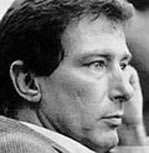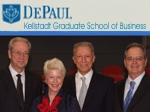Humankind Must Find A New Self-Awareness
USA TODAY, December 14, 1982
USA TODAY: You have been calling on people to take responsibility for their own lives. How is that possible when there are forces - inflation, unemployment and nuclear armament - over which they have no control?
WERNER ERHARD: We don’t mean that people are at fault for, to blame for, or should feel guilty about their circumstances. It’s possible to create for oneself a context of responsibility. Life presents circumstances no one of us has complete control over. But in a context of responsibility, I would say, for instance, about the recession: “I can be responsible for the quality of my life in this recession. I can do something about the circumstances I find myself in. I’m not powerless or a victim.” A context gives one the opportunity to think creatively, rather than to think only reactively. It is not a justification, an explanation or a prescription. A context is a place from which you approach the circumstances of life. One then can deal with life from a sense of some personal effectiveness.
USA TODAY: Most recently, you have been telling people to take a stand for the future. How should they do that?
WERNER ERHARD: Our thinking needs some new possibilities and new opportunities. I’m not giving people answers, but rather attempting to bring forth a breakthrough in opportunities to think creatively. I like that Chinese proverb which says, “If we don’t change our direction we’re gonna wind up where we’re headed.” We need a new paradigm of being and thinking and acting. We need to be aware that our answers are shaped by the paradigm of thinking in which we work out solutions and not merely do more, better or variations of the same kind of thinking. I’m asking people to stop and take a look behind their thoughts.
USA TODAY: Can you show us how we have failed to take new directions?
WERNER ERHARD: In our relationship with the Soviet Union, we seem to go through a series of cycles. First we move to the left — I don't mean by this any political connotation — and if that doesn't work, we move to the right. If that doesn't work, we move back where we were before. What we need to do is find other dimensions in which we can move, instead of doing our thinking in established patterns. To take a stand for the future is to bring forth an opportunity not borne of the path we've taken in the past but borne of a vision which we would create for ourselves.
USA TODAY: What is your vision for the future?
WERNER ERHARD: Inherent in human beings are possibilities which we now can't even entertain. Before the space launch, space travel to many of us was the stuff of fantasy, of science fiction. We know what it is to explore the limits of what we consider to be a human being, but if we were to transform our understanding of ourselves, if we were to transform what we knew a human being to be, new possibilities of expression would open. We could function in a more creative way, in a more humane way. In the past, we were transformed by the thrust of evolution or by accidental forces. This time we should transform ourselves with a conscious, committed degree of selfawareness.
USA TODAY: Who is going to make this happen?
WERNER ERHARD: It is up to ourselves. The quantum jumps of such a transformation have been worked on for years, but in the Ivory tower of philosophy. It’s time to take the idea of such a transformation into the streets, and let people think and work it out for themselves.
USA TODAY: Is it harder to be a human being today than it has been before?
WERNER ERHARD: Yes. Every age has had its problems, including many we face today. But we need to recognize that when the rate of change in living occurs so sharply, we really have a new issue confronting us. The acceleration is going up. As a result we're confronted with the demand and opportunity for a transformation of what it means to be human.
USA TODAY: That sounds like a nearly impossible set of circumstances for a person to come to grips with.
WERNER ERHARD: We know ourselves pretty well in terms of our set of circumstances: born at such a time in such a community with such an education. What's required to fulfill ourselves now is to come to grips with our power to bring forth contexts for our lives. We need to start to come to grips with the fact that we're not stuck with who we are or what we are.
USA TODAY: Some might argue that it is not worth the effort to redefine themselves when faced with the possibility of nuclear extinction. How do we reckon with the potential for humankind's destruction?
WERNER ERHARD: I think it's clear that we're capable of destroying ourselves with nuclear weapons and perhaps in some other ways as well. People ought to learn the facts rather than just take a side in the nuclear debate. They can then express their own sense of it and find ways to be heard. That may mean discussing it, writing to people who represent them, or voting on related issues.
USA TODAY: If you could have everyone ask or tell himself or herself something each morning when he or she woke up, what would it be?
WERNER ERHARD: "Where do I want to be coming from today?" I'm going to see good things and bad things, right things and wrong things, nice things and not nice things but where do I want to be coming from in dealing with those things today? Would I like to create a context of contribution? Would I like to create a context of responsibility? Or would I rather have a context of protecting myself? Would I rather have a context of trust or mistrust?
USA TODAY: But the est training has been described as an opportunity for some 350 people to sit in a hotel ballroom and not be allowed to eat or go to the bathroom. It was satirized in the movie Semi-Tough. And trainers have been described as a mixture of Lenny Bruce, Don Rickles and Attila the Hun. How accurate are those observations?
WERNER ERHARD: In the sense of fun, they're a lot of fun. In the sense of portraying the truth, they don't even come close. People obviously get to eat before they come to the morning training, and during the break in the evening. If someone has got to go to the bathroom in between those times they get up and go. The training is done with a very deep compassion and concern for people, and results show that.
USA TODAY: What do you care most about in life?
WERNER ERHARD: One of the things is family. I don't mean only people to whom I’m related by blood, but people with whom there is the sense of being in it together, the sense of being deeply appreciated by others even if they can't figure you out. For most of my life I thought my mother didn't understand me, but I never had a question about her deep sense of appreciation. And I care about opportunity. It's fundamental to fulfillment that opportunity be available to people. A world in which any people are cut off from opportunity for fulfillment cannot work.
Originally published in USA TODAY, December 14, 1982.
Transformation: The Life and Legacy of Werner Erhard
This documentary was created by the independent filmmaker and two-time Emmy Award Winning Producer for PBS, Robyn Symon. It chronicles the history Werner Erhard, his life, the world of the est Training and his work and the ideas, all put into perspective through the dozens of stories told by numerous professional and academic experts. Transformation: The Life and Legacy of Werner Erhard is available in DVD by clicking here.

Current Work...
Werner On...

